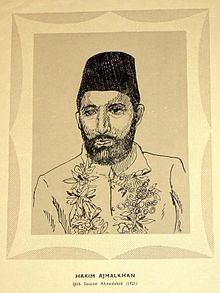Hakim Ajmal Khan
| Hakeem Ajmal Khan | |
|---|---|

Hakim Ajmal Khan
|
|
| Born |
11 February 1868 Delhi |
| Died | 29 December 1927 |
| Nationality | Indian |
| Occupation | physician, politician |
Hakim Ajmal Khan was one of the founders of the Jamia Millia Islamia University, becoming its first chancellor in 1920 and remaining in office until his death in 1927.
Born in 1868 (17 Shawwal 1284), Khan descended from a distinguished line of physicians who had come to India during the reign of Mughal Emperor Babar. His family were all Unani doctors who had practised this ancient form of medicine since their arrival in the country. They were then known as the Rais of Delhi. His grandfather, Hakim Sharif Khan, was physician to Mughal Emperor, Shah Alam and built the Sharif Manzil, a hospital-cum-college teaching Unani medicine.
Khan learnt the Quran by heart and as a child studied traditional Islamic knowledge including Arabic and Persian, before turning his energy to the study of medicine under the guidance of his senior relatives, all of whom were well-known physicians. To promote the practice of Tibb-i-unani or Unani medicine, his grandfather had set up the Sharif Manzil hospital-cum-college known throughout the subcontinent as one of the best philanthropic Unani hospitals where treatment for poor patients was free. He completed his Unani studies under Hakeem Abdul Jameel of Siddiqui Dawakhana, Delhi.
On qualifying in 1892, Khan became chief physician to the Nawab of Rampur. Hailed as "Massiha-e-Hind" (Healer of India) and "a king without a crown", Khan, like his father, was reputed to effect miraculous cures and to have possessed a "magical" medicine chest, the secrets of which were known to him alone. Such was his medical acumen that it is said that he could diagnose any illness by just looking at a person's face. Hakim Ajmal Khan charged Rs. 1000 per day for an out-of-town visit but if the patient came to Delhi, he was treated free, regardless of his position in society.
Khan proved to be the most outstanding and multifaceted personality of his era with matchless contributions to the causes of Indian independence, national integration and communal harmony.
He took great interest in the expansion and development of the native system of Unani medicine and to that end built three important institutions, the Central College in Delhi, the Hindustani Dawakhana and the Ayurvedic and Unani Tibbia College, which expanded research and practice in the field and saved the Unani System of Medicine from extinction in India. His untiring efforts in this field infused a new force and life into an otherwise decaying Unani medical system under British rule. Khan proposed the absorption of Western concepts within the Unani system, a view diametrically opposite to that adopted by physicians of the Lucknow school who wanted to maintain the system's purity.
...
Wikipedia
